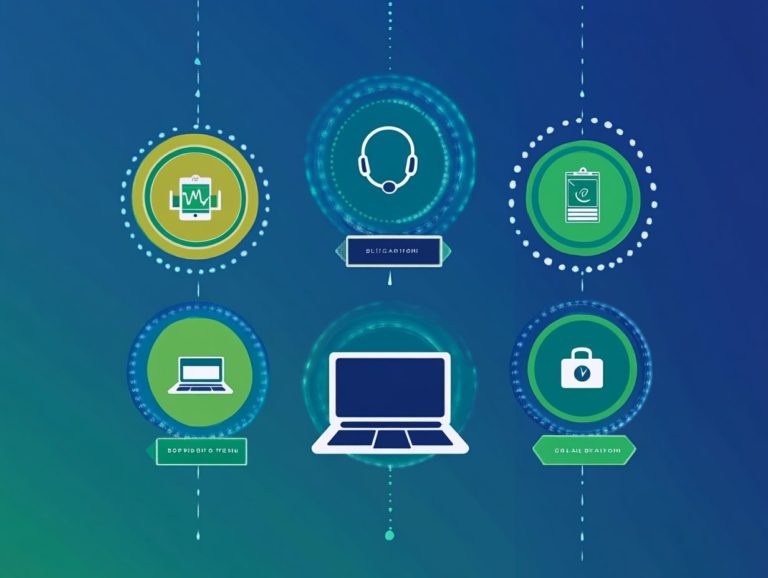The Importance of Certifications in Telemedicine
Telemedicine is revolutionizing the healthcare landscape, making access and convenience a reality for patients worldwide.
It’s crucial to understand the importance of certifications for telemedicine providers. These certifications not only elevate the quality of care but also build trust between patients and healthcare professionals.
You ll encounter challenges along the way, including ongoing debates about standardization and accessibility. This article delves into the rise of telemedicine, the array of certifications available, and what the future may hold for this dynamic field.
Join us as we explore the fascinating world of telemedicine!
Contents
- Key Takeaways:
- The Growing Popularity of Telemedicine
- Understanding Certifications in Telemedicine
- Benefits of Certified Telemedicine Providers
- Challenges and Controversies Surrounding Certifications
- Future Outlook for Telemedicine Certifications
- Frequently Asked Questions
- What are certifications in telemedicine and why are they important?
- What are the benefits of having certifications in telemedicine?
- Who can obtain certifications in telemedicine?
- What are some popular certifications in telemedicine?
- How do telemedicine certifications differ from traditional medical certifications?
- Do healthcare professionals need certifications in telemedicine to practice?
Key Takeaways:
Telemedicine is becoming increasingly popular, creating a demand for certified providers to ensure high-quality care. Certifications in telemedicine come in various forms and are crucial for providers to demonstrate their expertise and credibility.
Certified telemedicine providers have the potential to improve patient satisfaction and trust, ultimately leading to better overall care outcomes.
The Growing Popularity of Telemedicine
The rising popularity of telemedicine has transformed the healthcare landscape, particularly during the COVID-19 pandemic.
Medical practitioners and healthcare professionals are increasingly embracing telehealth services for remote care. This transformation isn t just a fleeting trend; it represents a profound evolution in how patients access medical care and how providers deliver it.
In the United States, state boards and regulations are evolving to keep pace with this new reality. It’s an exciting time for both patients and providers alike.
Exploring the Rise of Telemedicine
The rise of telemedicine results from several interconnected factors, most notably the surging demand for remote care solutions during the COVID-19 crisis.
Beyond the pandemic’s push toward virtual visits, technological advancements have made it increasingly easy to connect with healthcare providers from the comfort of your home. With the widespread availability of smartphones and high-speed internet, accessing telehealth services has become remarkably user-friendly and efficient.
As you seek convenient healthcare options that align with your busy lifestyle, the expectation for accessible healthcare continues to rise. Telehealth gives you the power to focus more on preventive care!
This allows you to take control of your health while ensuring regular check-ins with your providers.
Understanding Certifications in Telemedicine
Understanding certifications in telemedicine is essential for ensuring that you, as a medical practitioner, meet the necessary standards for effectively delivering telehealth services, including the value of certification in healthcare IT.
With a range of telehealth certification programs available many recognized by the Accreditation Council for Graduate Medical Education, which ensures medical education quality you’ll need to navigate the requirements established by state boards.
This effort not only ensures compliance but also upholds the highest standards of patient safety.
Types of Certifications Available
Several types of certifications are available for healthcare professionals venturing into telemedicine.
You can choose from telehealth certification, telemedicine certification, and specialized programs such as the TeleMental Health Training Certificate.
Each of these certifications targets distinct aspects of remote healthcare delivery and ensures you acquire the essential skills to operate effectively in this evolving landscape.
For instance, telehealth certification often emphasizes the broad application of technology in patient care, while telemedicine certification dives deeper into clinical protocols and ethical considerations in virtual settings.
The TeleMental Health Training Certificate specifically focuses on mental health practices, equipping you with the tools to provide psychological support via digital platforms.
By pursuing these certifications, you enhance your competency and boost your credibility, ultimately leading to improved patient outcomes in a rapidly changing healthcare environment.
Importance of Certifications for Providers

Certificaciones para profesionales de salud son esenciales para garantizar la seguridad del paciente. Aseguran que t , como profesional, posees las habilidades y conocimientos necesarios para ofrecer atenci n de alta calidad a distancia.
Estas credenciales mejoran la confianza del paciente en el paisaje digital de la atenci n m dica. Tambi n establecen un est ndar para la entrega de atenci n de calidad.
Cuando los pacientes notan que sus proveedores tienen certificaciones reconocidas, esto aumenta significativamente su confianza en las consultas remotas. Esto lleva, en ltima instancia, a una mejor adherencia a las recomendaciones de tratamiento.
A medida que la industria de telemedicina contin a expandi ndose, mantener altos est ndares a trav s de la certificaci n es crucial. Esto ayuda a mejorar tu reputaci n en este campo din mico.
Este nfasis en la calidad se traduce directamente en mejores resultados para los pacientes. Subraya el papel vital que estas certificaciones juegan dentro del contexto m s amplio de la atenci n m dica.
Benefits of Certified Telemedicine Providers
Certified telemedicine providers offer a wealth of advantages to the healthcare landscape.
Their specialized training in telehealth practices ensures enhanced patient safety. This significantly improves the quality of care.
By following the best practices in healthcare, they elevate the overall healthcare experience. This makes it more efficient and effective for everyone involved.
Improved Quality of Care
One of the foremost benefits of opting for certified telemedicine providers is the enhanced quality of care you can expect. Their rigorous training ensures they prioritize patient safety protocols.
You ll notice these enhancements in standardized procedures for virtual consultations. These procedures guide healthcare professionals in diagnosing and treating patients effectively from a distance.
Certified providers employ evidence-based practices that focus on improving patient outcomes. This leads to notable increases in treatment adherence and overall satisfaction.
Ongoing education is vital. It keeps healthcare providers informed about the latest technologies and methodologies, fostering a culture of continuous improvement.
As telehealth continues to evolve swiftly, these certifications are more important than ever to ensure quality care. They also reflect a steadfast commitment to enhancing patient experiences and health outcomes in this digital landscape.
Increased Patient Trust and Satisfaction
Certified telemedicine providers dramatically enhance your trust and satisfaction. They showcase their dedication to established standards and deliver safe, reliable telehealth services.
When you see that your healthcare providers hold credible certifications, it reassures you about the quality of care. This cultivates a sense of safety in the virtual space.
Feeling secure is key to fostering trust when sharing sensitive health information. This paves the way for better communication, ultimately leading to improved healthcare outcomes.
The presence of certifications signals that a telemedicine provider has undergone rigorous training and evaluation. This further bolsters your perception of their professionalism and reliability.
Challenges and Controversies Surrounding Certifications
While the benefits of certifications in telemedicine are substantial, you may encounter several challenges and controversies.
Chief among these are the costs and accessibility of these programs for healthcare professionals throughout the United States.
For your health needs, consider seeking certified telemedicine providers to ensure you receive the best possible care.
Cost and Accessibility

The cost of certification programs can be a significant barrier for many healthcare professionals, limiting access to essential training in telehealth and telemedicine.
These cost issues are particularly striking, as expenses associated with these programs can vary greatly depending on factors such as the program’s duration, the institution offering it, and the certification’s reputation in the industry.
For many, the initial investment in training may not feel justified, especially when considering ongoing costs like study materials and recertification fees.
This financial hurdle can affect not only career growth but also overall competency within the healthcare field. Professionals may delay or forgo crucial certifications necessary for adapting to the rapidly evolving landscape of patient care.
Debate over Standardization
The ongoing debate about standardizing telehealth certifications is creating buzz among state boards, healthcare professionals, and industry leaders, all discussing the pressing need for consistent training and assessment.
As telehealth services expand nationwide, the lack of cohesive certification standards presents significant challenges for providers and patients. Without uniform guidelines, navigating differing state regulations can affect the quality of care delivered.
For patients, uncertainty around the qualifications of their telehealth providers can erode trust in these emerging services. Establishing a unified framework could enhance telehealth credibility and promote a smoother experience for users, regardless of their location.
The call for a collective approach to address these disparities has never been more urgent, highlighting the essential role that collaboration among state boards and healthcare organizations plays in shaping a sustainable telehealth landscape.
Future Outlook for Telemedicine Certifications
Exciting changes are coming for telemedicine certifications! You can expect advancements designed to elevate both the quality and accessibility of training programs for healthcare professionals in this swiftly evolving healthcare landscape.
Potential Changes and Developments
Upcoming changes in telemedicine certifications may include cross-state licensing agreements. These agreements streamline the certification process for healthcare professionals across various states, enhancing access to care and enabling practitioners to deliver services effortlessly, regardless of geographical constraints.
As technology advances, incorporating cutting-edge digital tools and platforms into telehealth practices will be pivotal in shaping these certifications. Innovations coupled with regulatory updates will ensure that you, as a healthcare provider, are equipped with essential skills and knowledge to navigate an ever-evolving landscape.
This collaboration between regulation and technology not only expands the horizons of telehealth practices but also reinforces patient safety and quality of care, emphasizing the significance of adaptive standards in this dynamic field.
Frequently Asked Questions
What are certifications in telemedicine and why are they important?

Certifications in telemedicine are specialized credentials that demonstrate a healthcare professional’s knowledge, skills, and experience in providing virtual healthcare services. They are important because they assure patients that the provider they are seeing is qualified and capable of offering high-quality telemedicine services, highlighting the importance of PM certifications in healthcare.
What are the benefits of having certifications in telemedicine?
Having certifications in telemedicine can benefit healthcare professionals by enhancing their credibility and marketability. It also allows them to expand their practice, reach more patients, and stay updated on the latest technologies and best practices in telemedicine.
Ready to advance your telehealth skills? Start your certification journey today!
Who can obtain certifications in telemedicine?
Certifications in telemedicine are available for healthcare professionals like physicians, nurses, and mental health providers. Research which certification fits your profession best.
What are some popular certifications in telemedicine?
Popular certifications include the Certified Telemedicine Professional (CTP) and Certified Telemedicine Clinical Presenter (CTCP) from the American Board of Telehealth. The American Telemedicine Association also offers similar credentials.
How do telemedicine certifications differ from traditional medical certifications?
Telemedicine certifications focus on using technology and virtual communication for healthcare. Traditional certifications primarily emphasize in-person patient care skills.
Do healthcare professionals need certifications in telemedicine to practice?
While not mandatory, certifications are strongly recommended. They can provide a competitive edge in the fast-growing telemedicine field. Check your state s regulations for specific requirements.







